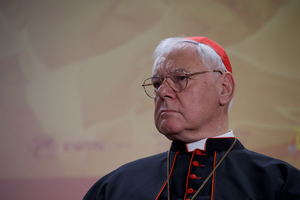The Vatican’s China Game: Deal or No Deal With Beijing?
China’s Communist government still wants an agreement over bishops’ appointments, but the Vatican appears more ambivalent in the face of criticism and recent problematic developments.

The Holy See needs to be humble and willing to end talks until they obtain “anything real” from the Chinese government, Cardinal Joseph Zen Ze-kiun has said.
In April 5 comments to the Register — made in the wake of a range of recent actions by the communist government that appear hostile to the free practice of religion — the bishop emeritus of Hong Kong said if Rome “cannot get anything real from the negotiations, they should acknowledge the objective impossibility and failure and say goodbye to the other side till they have anything new to talk about.”
The cardinal, an outspoken critic of the Vatican’s current approach to China, added that, in the meantime, the Holy See should continue about its “business, strengthen our own Church and be ready to suffer, waiting for God’s good time.”
His comments came after months of speculation that, in a possible deal aimed at normalizing relations, the Vatican would be given a say in the appointment of future bishops in China, while Beijing would have more control over the country’s churches loyal to Rome.
Under the terms of the proposed deal, the Catholic Church is expected to have very restricted oversight over the appointment of bishops, with the Pope holding, at most, a veto. In return, the “underground” Church would be accepted by the state.
China’s 12 million Catholics are split between those registered with the state-controlled Catholic Patriotic Association, which rejects the authority of the Holy See and appoints its own bishops in collaboration with local Church communities, and a larger community of “underground” Catholics who recognize the Pope, are loyal to Rome and have historically resisted the Patriotic Association. The split dates back to the Communist Party victory in 1949 and Beijing’s subsequent break in diplomatic relations with the Holy See in 1951.
A major sticking point in re-establishing relations has been over the appointment of bishops. Most bishops are now recognized by the Holy See and the Patriotic Association. Occasionally, however, Beijing has ordained its own bishops in the face of Vatican opposition, which has led to excommunications.
Cardinal Zen’s remarks also come after the Chinese government placed religious affairs under the ruling atheist Communist Party at the end of March — a move widely seen as a means of exerting greater control over the Church and other religions. The decision followed the introduction of revised “Religious Affairs Regulations,” introducing new restrictions on religious practices.
The Hong Kong cardinal, who once taught in a seminary in China, has strongly criticized the possible deal, accusing the Vatican of “selling out” to the Chinese Communists, deploring a lack of communication between the Holy See and the Chinese faithful, and saying they feel they are on the “periphery.” Chinese government officials have reportedly said the framework for the deal has already been worked out and talks have been in “full swing,” but the Vatican has publicly denied its signing is imminent, signaling different approaches to the issue. The Register understands from informed Vatican sources that the agreement “won’t happen in the next days, weeks or months.”
Controversial Moves
But the Vatican has already taken highly contentious steps along the path of the agreement: In December, it made the decision to order 88-year-old Bishop Peter Zhuang Jianjian of Shantou of the underground Church to step aside for a state-backed bishop to succeed him and be reconciled with the Holy See and to give Bishop Zhuang the title “emeritus.”
At the same time, a government-appointed bishop, Zhan Silu, was allowed to take the place of a Vatican-recognized bishop, Guo Xijin of Mindong. Bishop Guo was made an auxiliary and granted official recognition in return.
Police arrested Bishop Guo in March, after he refused to concelebrate with Bishop Zhan at a chrism Mass, as Bishop Zhan is still excommunicated due to his membership in the state-controlled church. Following Bishop Guo’s release, the authorities banned him from celebrating any Mass as a bishop, as he is not recognized by the government.
“Bishop Guo was called to the office of the public security and had a two-hour conversation,” Cardinal Zen recounted to the Register. “He came back to pack and was taken away for that night.”
He conjectured that the authorities freed him the next day because the government was “not able to force him to concelebrate with the illegitimate ‘bishop’” and so told him “not to celebrate a parallel chrism Mass.”
“These exchanges of bishops have no precedent and are very serious in themselves,” Cardinal Zen remarked about the situations of Bishops Zhuang and Guo, adding they are “much more serious if you consider the impact on their clergy and faithful.” He said such a policy comes as a “shock” to the faithful, who “cannot but feel betrayed.”
“And what can the other 30 underground bishops expect for themselves?” he asked. “Probably to be declared emeriti if they refuse to join the Patriotic Association.”
Weigel’s Assessment
Others drawing on historical precedent, such as George Weigel, distinguished senior fellow at Washington’s Ethics and Public Policy Center, see this approach as doomed to failure and reminiscent of Ostpolitik — the controversial strategy pursued by the Vatican in the 1960s and 1970s to appease and make agreements with Soviet Communism.
Weigel told the Register April 11 that, for almost 30 years, he has been in contact with “the people who kept Catholicism alive behind the Iron Curtain,” and they would answer: “No, there is nothing to be said for that approach.” He also said the Ostpolitik approach allowed the Vatican to be “severely penetrated by East bloc secret intelligence agencies.”
Asked why he believed the Vatican was determined to pursue what appears to be the same strategy, Weigel said: “Italians in the Secretariat of State have been obsessed with getting some sort of diplomatic arrangement with China in place for at least 30 years, and they undoubtedly see this proposed deal on nominating bishops as a step toward that.”
He added it would be “a remarkably bad idea” to have the Chinese Communist Party nominate bishops, particularly now that President Xi Jinping has shifted responsibility for the oversight of religious groups from the Chinese state to the Communist Party. Through such actions, including restrictions on selling Bibles, Beijing has made it clear in recent months that it wants total control over the Church.
Weigel added that he found it “astonishing” that the Secretariat of State is so resistant to the “empirically verifiable fact” that the Ostpolitik of the 1960s and 1970s “was a complete failure” and, in some cases such as Hungary, “made matters far worse for the Church.”
Vatican Misperception?
Both Weigel and Cardinal Zen believe the Vatican is operating on the false premise of continuing to seek to wield the global influence it had in the 19th century, when it was in possession of the extensive territories of the Papal States.
The Italian officials in the Curia, Weigel wrote in a recent article in Foreign Policy magazine, fantasize that today’s Holy See “can act internationally as if this were 1815, when Cardinal Ercole Consalvi, Pope Pius VII’s chief diplomat, was a significant actor at the Congress of Vienna.
“Those shaky foundations and that fantasy are not a prescription for diplomatic success. They are, rather, a prescription for both diplomatic and ecclesiastical failure, which is the likely result of the deal now being bruited between the Vatican and China.”
Cardinal Zen similarly said the Holy See was deluded in thinking “themselves big players in world politics” and believes recent comments by Holy See officials in praise of China, despite its poor record on religious freedom and human rights, just mean that “historians are, and will be, laughing at them.”
Some Vatican insiders speculate that the overall aim of the Vatican’s strategy is to secure an historic papal visit to the country — a development that would mark a significant step in the normalization of relations. Cardinal Zen said “that may be,” adding that “all the popes had such a desire.”
But he said Pope Francis “should know that a visit by him to Beijing will not be like a visit by John Paul II to Poland,” as he would be “manipulated” and would cause “so much sadness in the good faithful.”
Weigel did not think a papal trip was a motivating factor, but simply an “Italian obsession of long standing.” He said both Pope St. John Paul II and Benedict XVI could have pursued the proposed Vatican agreement, but “refused it because they knew it would increase regime pressures on the Church in the short term and would imperil the Church's evangelical future in China.”
Rome’s Position
In Jan. 31 comments to La Stampa, Cardinal Pietro Parolin, the Vatican secretary of state, argued that the Church is called to “distinguish more appropriately the spiritual and pastoral dimension from that of politics,” using words such as mercy, forgiveness and reconciliation rather than “power, betrayal, resistance, surrender.”
He said “a serious problem” exists if the Church is not prepared to “change this approach” of “thinking and acting only politically.”
The Holy See, he said, “hopes for everyone a sincere pastoral conversion inspired by the Gospel of mercy, in order to learn to welcome one another among brothers and sisters, as Pope Francis has often called for.”
The cardinal also said it takes “greater humility and spirit of faith to discover together God's plan for the Church in China” and warned against falling into “sterile polemics that hurt communion and rob our hope for a better future.”
The Italian cardinal, who said he prefers to see “not two Churches, but two communities of faithful called to follow a gradual path of reconciliation toward unity,” underscored his belief that the process is “gradual” and will therefore require “time and patience” in order to build trust.
Neither Cardinal Parolin nor Archbishop Paul Gallagher, the Vatican’s secretary for relations with states, wished to answer questions on the issue when approached by the Register for comment in early April, after the Chinese government had communicated publicly and forcefully that all religions active in Chinese are required to acknowledge the primacy of the state.
But speaking on background, a Vatican source told the Register that the Holy See rejects the accusation that the approach is similar to Ostpolitik, which it sees as an approach related to “majority-Catholic” nations, such as Poland, and where the Church had a political role in the history of a communist country.
By contrast, the source said the Vatican sees the situation in China, which does not have such a history, as very different. The Pope, therefore, wants to enter into the pastoral situation of the country and the Church’s pastoral mission in China, where the emphasis is on dialogue rather than politics.
The source also said the Pope and senior Vatican officials are “very attentive to all views” but stress the importance of working “in unity” and in dialogue, without polemics.
In comments to German media April 11, Cardinal Zen said the Pope is better informed now than before and is surrounding himself with more “levelheaded, mature people” who have “now warned him” of possible dangers.
Edward Pentin is the Register’s Rome correspondent.
- Keywords:
- edward pentin
- vatican-china relations


















